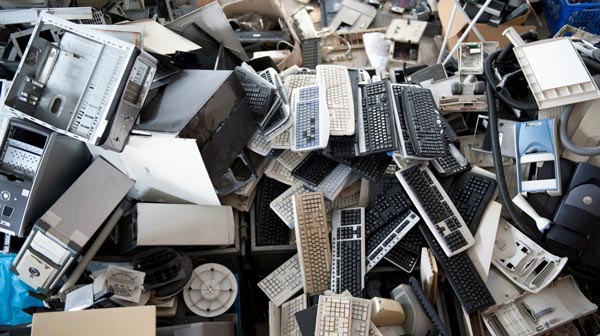Eco-Friendly Electronic Devices Recycling Solutions: Depend On the R2 Certification Requirement
Eco-Friendly Electronic Devices Recycling Solutions: Depend On the R2 Certification Requirement
Blog Article
Master the Needs of R2 Qualification to Guarantee Sustainable Business Practices
At the center of this movement is the R2 qualification, a rigorous standard that establishes the bar high for electronic devices recyclers and refurbishers. As companies strive to line up with environmentally aware practices, understanding the requirements of R2 qualification is extremely important. In a globe where sustainability is no longer a mere buzzword yet a service vital, diving right into the intricacies of R2 qualification is a calculated move that can pave the means for long-lasting success and positive environmental impact.
Relevance of R2 Qualification
Achieving R2 Qualification is vital for businesses intending to show their commitment to sustainable and accountable digital waste monitoring methods. This certification, developed by SERI (Sustainable Electronics Recycling International), sets the requirement for liable reusing methods in the electronics sector. By obtaining R2 Certification, businesses signal to their stakeholders that they follow rigorous ecological, health and wellness, and security regulations while taking care of digital waste.
Among the vital reasons that R2 Certification is very important is its emphasis on sustainability. With digital waste being a significant worldwide concern, organizations need to showcase their dedication to decreasing the environmental influence of their operations. R2 Certification needs business to implement processes that ensure the proper handling, refurbishment, and recycling of digital waste, therefore adding to the round economic climate and minimizing the build-up of e-waste in land fills.
In Addition, R2 Qualification boosts a business's reputation and reliability. In today's environmentally conscious market, customers and companions are significantly seeking to work together with organizations that prioritize sustainability. By achieving R2 Certification, firms can identify themselves as leaders in accountable e-waste monitoring, acquiring a competitive edge and attracting similar stakeholders.
Key Components of R2 Specifications

Actions to Acquire R2 Qualification
To receive R2 Accreditation, organizations have to thoroughly show conformity with a set of rigorous standards and standards. The process of acquiring R2 Qualification involves several essential steps. The primary step is to acquaint oneself with the R2 go to this site Requirement and its demands. This includes comprehending the principles of responsible recycling, data safety and security, environmental management, and employee health and wellness and security that form the foundation of the qualification.
Next, companies require to assess their present techniques and procedures to determine anchor any kind of gaps that require to be dealt with to satisfy the R2 Requirement. This may include applying new treatments, buying training programs, or making changes to existing operations. When any type of shortages are corrected, organizations can continue to develop a detailed management system that aligns with the R2 demands.
Complying with the application of the essential changes, organizations must undertake a third-party audit to confirm their conformity with the R2 Standard (r2 certification). This audit is conducted by a certified qualification body and consists of a thorough testimonial of the organization's centers, treatments, and documents. Upon successful conclusion of the audit, organizations can receive their R2 Certification, demonstrating their dedication to liable and lasting organization practices
Benefits of R2 Compliance
Companies that adhere to R2 conformity standards can open a myriad of benefits in today's lasting service landscape. In addition, R2 conformity promotes ecological sustainability by making certain that digital waste is handled in an ecologically friendly way, decreasing the influence on land fills and natural resources. Generally, achieving R2 conformity not only helps organizations fulfill regulative requirements however likewise cultivates a society of ecological responsibility and operational excellence.
Maintaining R2 Accreditation
Showing an ongoing commitment to liable digital waste management methods, organizations should concentrate on the careful process of preserving R2 accreditation. Preserving R2 certification involves normal audits, internal reviews, and constant improvement initiatives to make sure conformity with the strict requirements established forth by the Accountable Recycling Practices (R2) requirement. Organizations should remain vigilant in checking their digital waste monitoring procedures, information protection measures, and total ecological performance to maintain their R2 accreditation status.
Regular training and education and learning for employees are vital to preserve R2 qualification, as personnel require to be well-informed regarding the most recent ideal methods and market requirements. Maintaining detailed records and documents of electronic waste recycling activities, downstream suppliers, and inner procedures is essential for demonstrating conformity during audits.
Moreover, companies need to proactively engage with their supply chain partners and vendors to make sure that all entities entailed in the digital waste administration procedure abide by R2 requirements. By cultivating a culture of transparency, accountability, and continual renovation, services can effectively keep their R2 qualification and promote their dedication to sustainable service practices.
Final Thought

Achieving R2 Certification is crucial for businesses aiming to demonstrate their commitment to lasting and responsible digital waste monitoring methods. By acquiring R2 Accreditation, services signal to their stakeholders that they stick to rigorous ecological, health, and security regulations while taking care of digital waste.
Upon successful conclusion of the audit, businesses can receive their R2 Accreditation, showing their commitment to sustainable and accountable company practices.
Preserving R2 certification entails normal audits, interior evaluations, and continuous enhancement efforts to make certain conformity with the stringent needs established forth by the Liable Recycling Practices (R2) standard. By comprehending the vital components of R2 standards, taking the necessary actions to acquire qualification, and enjoying the benefits of R2 conformity, organizations can demonstrate their dedication to accountable electronic waste management.
Report this page